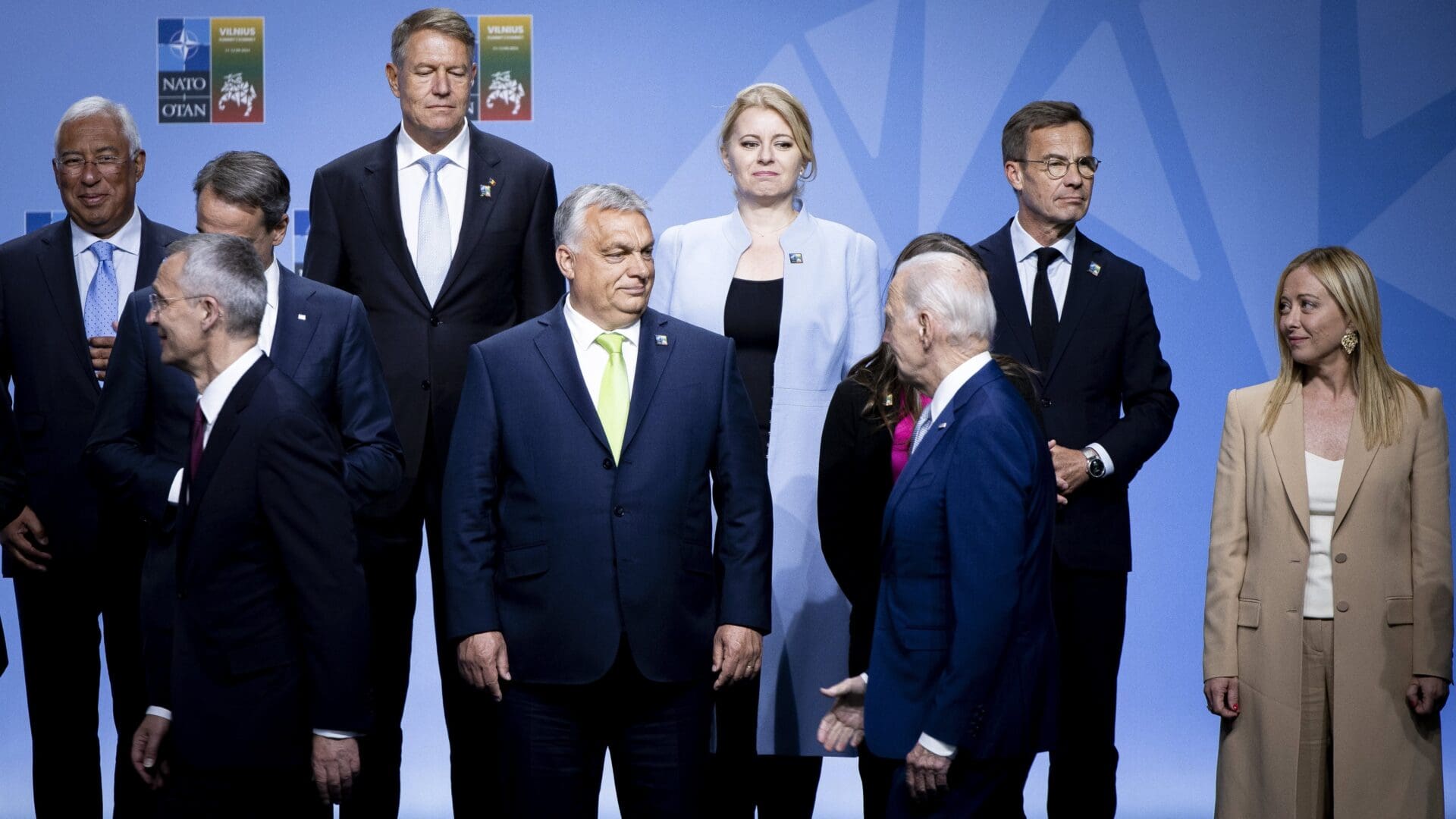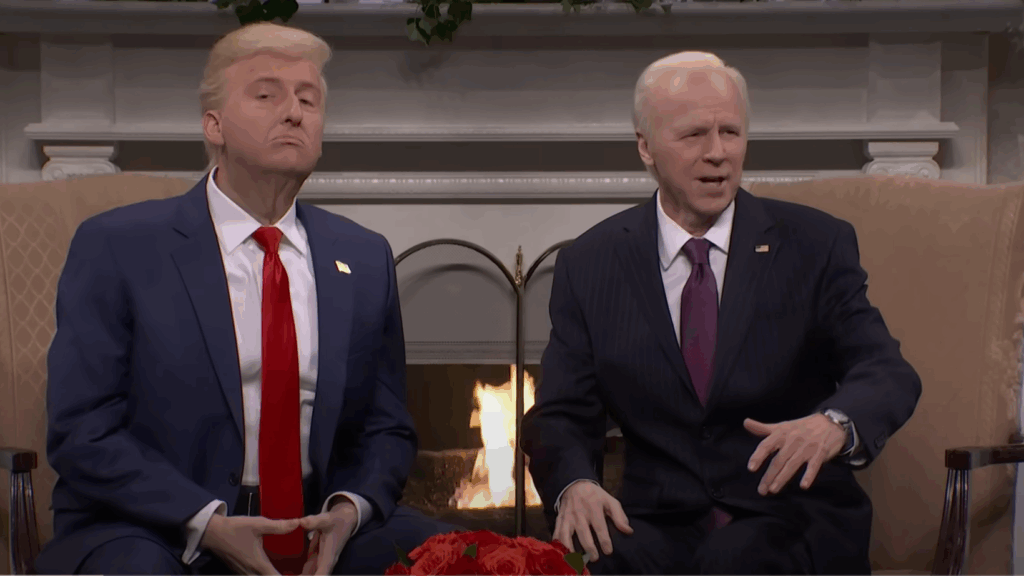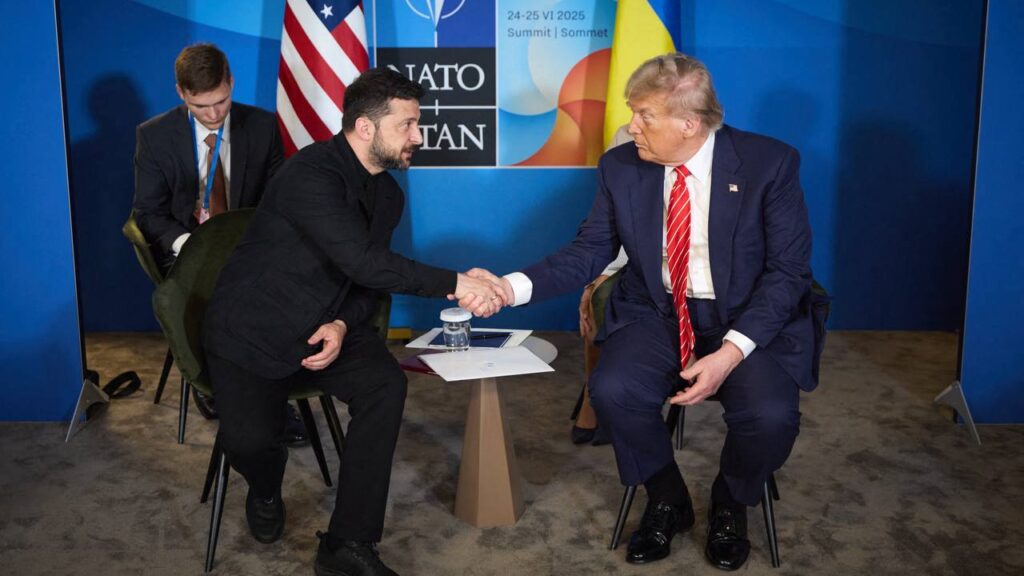Towards the end of the North Atlantic Treaty Organisation (NATO) summit in Lithuania, US President Joe Biden shook hands with Hungary Prime Minister Viktor Orbán as he lined up to pose for a picture with other heads of state. In fact,
Orbán was the only one Biden shook hands with during the photo event.
Biden’s gesture could have been a simple act of gratitude towards the Hungarian Prime Minister for his decision to eventually vote in favour for Sweden to join the NATO alliance. This came after Turkish President Recep Tayyip Erdoğan agreed to send Sweden’s NATO accession protocol to the Turkish Parliament ‘as soon as possible.’ Hungary initially opposed Sweden’s membership—NATO requires a unanimous vote from its member states to allow a new country to join the alliance.
Hungarian media initially speculated that the American President might have made a mistake or confused Orbán with someone else, considering that the political branch of the US-Hungarian relationship is at an all-time low. Yet, could Biden’s token, as some experts suspect, have been an invitation to the Hungarian government to hop on board the US geopolitical bandwagon and forget the Chinese and Russian one?
US-Hungarian Tense Relations
Orbán is certainly not one to be pushed around. He has demonstrated this with his Fidesz Party’s fortitude before an antagonistic European Union elite at Brussels. Yet he has faced equal conflict with Washington, so much so that on 22 February, Orbán allegedly accused the US as a main adversary during a ‘political strategy session’. This is according to a leaked document, which was posted online. The CIA said the inclusion of the US in Orbán’s ‘list of top three adversaries constitutes an escalation of the level of anti-American rhetoric in his discourse’.
Tensions between Washington and Budapest became even more bitter after Orbán, notwithstanding condemning the Russian aggression in Ukraine when the war broke out last year, maintained Moscow’s prominent position in Hungary’s energy market, allowing the Russians to build new reactor blocks in Paks. US-Hungarian relations, however, have been strained since as early as 2019.
Orbán, even though his friend then President Donald Trump piled on the pressure to shut out Huawei Technologies, has invested millions of forints with Huawei’s European Supply Center (ESC) plant just outside the capital city in Páty. In 2019, during a visit to Budapest by the US Secretary of State Mike Pompeo, Orbán was cautioned against deploying equipment from the Chinese company, saying it would make it more difficult for Washington to ‘partner alongside them’. The Hungarian Minister of foreign Affairs Péter Szijjártó brushed off US concerns over Russia and China, saying Budapest was fulfilling its obligations to Western allies as a member of the NATO military alliance.
Choosing Between the US and China
It goes without say, as was demonstrated this past week in Lithuania, that US hegemony is anything but feeble. The very fact that both Erdogan and Orbán followed suit with Washington’s push to allow Sweden to join NATO
has restrengthened the alliance and demonstrated its vital existence,
especially in light of Russia’s ongoing aggression.
Countries have been increasingly placed in the unenviable position of having to choose between the US and China as their competition or rather, rivalry, became more intensified. The Trump administration, for example, went as far as to threaten Poland that future US troop deployments might be at risk if Warsaw worked with Huawei, as well as warning Germany that the US would limit intelligence sharing if Berlin welcomed Huawei.
The Biden administration has vehemently pursued the same Trump policy. In 2021 President Bident signed into law a bipartisan legislation that will ban companies like Huawei from getting approval for network equipment licences in the US, citing that such companies facilitate the spying efforts of the Chinese Communist Party.
Washington’s CHIPS and Science Act offered some 50 billion USD in federal subsidies to American and foreign semiconductor manufacturers that are produced in the US—but only if they refrain from any ‘significant transaction’ to expand their chip-making capacity in China for ten years.
The Federal Communications Commission (FCC), citing a recommendation from the Trump-era Justice Department, said China Telecom America ‘failed to rebut’ a series of concerns raised.
‘China Telecom Americas, a US subsidiary of a Chinese state-owned enterprise, is subject to exploitation, influence, and control by the Chinese government and is highly likely to be forced to comply with Chinese government requests without sufficient legal procedures subject to independent judicial oversight’, the FCC said.
Washington unilaterally imposed export controls on high-end semiconductors used in China for supercomputing. Initially, the Netherlands and Japan—the other main countries that export chip manufacturing equipment to China—resisted. Soon thereafter, they were told to match the restrictions with limits of their own.
By early 2023, both Japan and the Netherlands had bowed to US pressure and done so.
Regardless, László György, State Secretary for Economic Strategy and Regulation of the Ministry of Innovation and Technology, said:
‘The investment in Páty is a prime example of Hungary being at the forefront of 5G technological developments.’
Also in 2021, the US, after learning that the United Arab Emirates had invited China to construct a port facility in their country, the Biden administration, concerned that Beijing intended to build a military base there, pressured Abu Dhabi to stop the project. While the UAE appeared to have halted construction, according to the The Washington Post it seems that work on the facility has restarted. In response, US Senator Chris Murphy, who chairs the Senate Foreign Relations Committee’s subcommittee on the Middle East, vowed to oppose the sale of armed drones to the UAE. Senate Foreign Relations Committee Chair Bob Menendez added:
‘Our friends in the Gulf have to decide, particularly on the security questions, who they want to turn to. If it’s China, then I think that’s a huge problem.’
On the other hand, Richard Fontaine, CEO of the Center for a New American Security, highlighted that ‘threats’ from the US are ultimately ineffective unless viable alternatives to Chinese products are offered.
‘Efforts to diversify away from Chinese supplies”, Fontaine says, ‘in areas including rare-earth minerals, solar panels, and certain chemicals will be feasible only if countries have other sources available at a reasonable cost. The United States cannot provide substitutes to everything that China makes and does, and in the majority of cases it need not do so. Instead, Washington should identify the areas with the greatest national security risks and work quickly with partners to develop alternatives.’
What is certain is that
there are risks in placing all eggs in the Chinese basket,
as indicated in a previous article. More so as, according to a Wall Street Journal report, foreign direct investment in China fell to 20 billion USD in the first quarter of this year, compared with 100 billion USD in last year’s first quarter. In fact, the report says that Goldman Sachs economists predict outflows from China this year will cancel out investment going into the country, a stunning change for a country that over the past four decades has consistently seen more money coming in than going out.
No country should be given an ultimatum to choose between the US and China. Yet, just as it was during the Cold War, many countries will have no choice but to chose one or the other.








